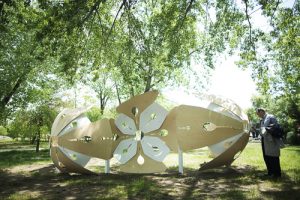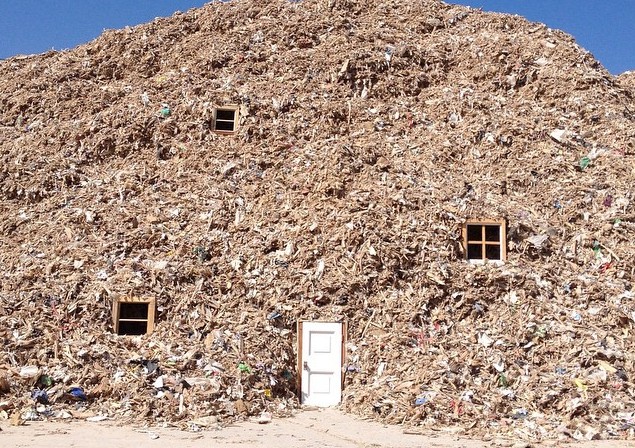The back lot of Revolution Recovery, a dumping station for recylable construction materials, in Northeast Philadelphia looks—to you and me—like what it is: A constantly-growing dusty pile of refuse from construction and demolition sites around the area. There are long scraps of mangled metal, ripped apart cardboard boxes, wallboard, plaster, two-by-fours and the random left-behinds that collect in homes before they are demolished—a single shoe, a VCR, a plaster owl. It is, decidedly, the stuff not needed anymore.
But for Billy Dufala and the artists he houses through Recycled Artists In Residence (RAIR), it is also a diamond mine, providing the very materials needed for conceptual art projects temporal and permanent, some of which have made their way into museums here and elsewhere. “Well, you have to know how to look at it,” Dufala acknowledges, as he scans the tipping yard, seeing potential in every truck that dumps its load. In just a few minutes, the sculptor—one half of artist duo Dufala Brothers—spots a metal electric box with wires hanging from it (discarded); a ceramic railroad insulator (he collects them); and one of those owls (so many owls show up). It’s dusty, and it’s dangerous dodging trucks and falling metal. But it is also, to Dufala, the answer to many artists’ pressing needs.

Through RAIR, Dufala and Fern Gookin, Revolution’s Director of Sustainability, offer the treasure of the tipping yard to eight artists a year, some of whom work out of a studio upstairs from Revolution’s office for several months at a time. The others do what RAIR calls Biggie Smallies—largescale temporary projects over the course of a few weekends that they document and then throw back in to the pit. They had 35 applications for the first year, 2014, and 65 for the 2015 program. They expect to double that number again in the open call that ends on November 30. This Wednesday, they are holding their annual fundraiser and silent auction to help fund its approximately $100,000 budget. (The event’s main sponsors are Revolution and the Tuttleman Family Foundation.) Among the works of art for sale are several pieces by former residents, made from material found at Revolution. (Tickets range from $35 to $75, for a VIP reception with a chance to buy the art outright.) While RAIR artists don’t have to make recycling or sustainability a message in their work, they are encouraged to limit their materials to what they find in the yard. Dufala says that can be daunting, even for artists accustomed to unconventional materials. But it also produces works of art, both spontaneous and meticulously planned, that couldn’t happen anywhere else.
Revolution Recovery itself is unconventional. Founded by Avi Golen and Jon Wybar in 2004, the company has a very specific mission: Keeping clean waste—like the sort that comes out of construction lots by the ton—out of landfills. They started with one dumpster, manually separating the waste into piles of plastic, wood, cardboard themselves. Now, they have a 3.5 acre lot in the Northeast that brings in 350 to 700 tons of construction waste every day, with several sorters both human and automated, and a business model that is growing: Construction and demolition sites pay them to remove their waste; Revolution sorts it, packages it, and sells it to companies that reuse the material for other products. RAIR furthers Revolution’s mission by repurposing the waste for sculpture—an odd, yet fitting, mix of commerce and art.
Dufala is a Pennsylvania Academy of Fine Arts-trained sculptor; his brother, Steven, is a PAFA-trained printmaker. (They were both also members of experimental rock band Man Man.) They collaborate on most of their work, which spans sculpture, installations and printmaking, and their pieces have shown at PAFA, the Institute of Contemporary Art and with Temple Contemporary. (Steven Dufala is also the set designer of the award-winning performance/installation “Object Lessons.”)
They discovered Revolution after years of unsuccessfully trying to get clean waste from traditional demo companies. (“Most were worried about liability,” he says. “I mean you tell them you’re an artist, they’re worried you’re going to get hurt and sue them.”) Instead, they took to the streets to get what they needed. Luckily—if you can call it that—it was often not too hard. In 2006, for example, the Dufala Brothers planned a Toilet Tricyle Race as part of the Fringe Festival. Only they didn’t have any spare toilets—and couldn’t afford to buy new ones. So Billy Dufala started riding around North Philadelphia, where in six weeks, he collected 15 toilets from abandoned city lots; he got tires from abandoned bikes around town. “So much of Philadelphia is a wasteland, with trash everywhere,” Dufala notes.
Revolution Recovery has a very specific mission: Keeping clean waste out of landfills. RAIR furthers Revolution’s mission by repurposing the waste for sculpture—an odd, yet fitting, mix of commerce and art.
A few years later, when Dufala needed skyscraper glass for a project, a friend suggested he try Revolution. The first surprise, he says, was that they allowed him on the lot. The second: They happened to have a load of damaged or otherwise remaindered glass from the construction of the Comcast tower—and offered him however much he needed. After that, Dufala says, he periodically pestered Golen and Wybar to let him (or his PAFA students) on to the lot, with varying success.
In 2010, Fern Gookin, at the time a sustainable design student at Philadelphia University, approached Revolution about starting RAIR, which is loosely based on a similar program in San Francisco, Recology. They hooked her up with Dufala. Still, he says they didn’t fully embrace him until Christmas of that year, when he offered to make their company Christmas card: A giant Rudolph the Red-Nosed Reindeer sculpture made from materials found at Revolution, standing next to him, dressed as Santa Claus. Since then, Revolution has provided RAIR with office and studio space, and free reign of the tipping yard (usually when trucks are not dumping); and RAIR has produced art, signs, planters and other items for Revolution.
The pairing has resulted in some remarkable works, like Abigail DeVille’s enormous cardboard homage to Richard Serra’s steel Torques Ellipse, which showed at ICA—and then was demolished and sent back to the pit at Revolution; and the Dufala Brothers Dumpster Coffin, which led to their Pew-funded pairing with Temple Contemporary for A Funeral For A Home, a neighborhood performance project in Mantua that culminated in a neighborhood-style “home-going” for an abandoned house that was then demolished.
“We started using found materials out of economics,” Dufala says. “But now, our work has become about the materials, and how they fit with the conceptual and contextual aspects of the work.”
Header Photo: rairphilly.org






